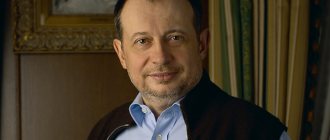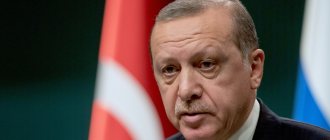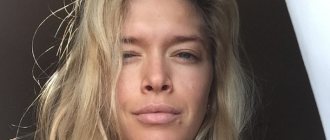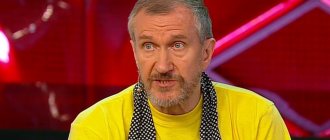Childhood and youth of Nikolai Rybnikov
Nikolai Rybnikov was born on December 13, 1930 in one of the maternity hospitals in Borisoglebsk. Nikolai's family was an ordinary Soviet unit of society. Father Nikolai Nikolaevich worked at a factory as a mechanic, and mother Klavdiya Aleksandrovna was involved in housekeeping and raising two sons (Nikolai had a brother, Vyacheslav). Some sources claim that the father of the future celebrity was an actor, but this data is not confirmed by anything.
Films with Nikolai Rybnikov are so popular that a stamp with a portrait of the actor was issued
Little Kolya’s father went to the front at the beginning of the Great Patriotic War, and his mother and sons moved to Stalingrad, which seemed safe at the time, where her sister lived. There the family was overtaken by the tragic news that Nikolai Nikolaevich Rybnikov died during the battle with the Nazis. Soon after receiving the funeral, Klavdia Alexandrovna also died. So the boys were left orphans in childhood. They survived the terrible days of the bombing. Nikolai later recalled that during the shelling of the city, he, not knowing how to swim, miraculously moved to the other safe bank of the river, clinging to fragments of trees and boats in which the same refugees were sailing. Probably, it was the incredible rescue from merciless German shells that taught Rybnikov to never give in to difficulties and always find the strength to move on.
After the end of the war, Nikolai continued to live in Stalingrad, receiving secondary education at the local railway school, and later at the fifth gymnasium. It was there that the boy's acting talents first appeared. After graduating from school, he got a job as a laborer at a local drama theater, which allowed him to watch all the performances and instilled confidence that the stage was his calling. But, despite your preferences. Nikolai went to study at the Stalingrad Medical Institute, from where he took his documents two years later, finally becoming convinced that medicine was not his path.
In 1948, Rybnikov set off to conquer Moscow. On his first try, he entered the famous VGIK, ending up in the group of S.A. Gerasimov and T.A. Makarova. His teachers recalled that Nikolai easily succeeded in the most complex roles and types. He easily read the monologues of Shakespeare's Hamlet and Romeo, Pushkin's Don Juan and Benckendorff, but, to the great regret of the actor himself, he most often got the roles of daring Komsomol members and conscientious brigadiers. Nicholas performed best in the role of Peter the Great, thanks to which the performance always attracted full houses. It was this fact that saved Rybnikov from expulsion from the All-Union State Institute of Cinematography, which almost happened because of the young man’s love for practical jokes.
March of the High-Altitude Workers We are not stokers, not carpenters from the film Heights Rybnikov Nikolai knew how to parody the voices of famous contemporaries. And so, during one of the student meetings, he hid in a wardrobe, from where, in the voice of the famous announcer Levitan, he announced that, by government decree, food prices were reduced five times, for wine and vodka products - seven times, and salt and matches in general should issued free of charge. No one suspected a trick, everyone shouted joyfully: “Hurray for Comrade Stalin!” After this, the entire campus discussed the news, and rumors reached the competent authorities. The incident caused a great resonance, Rybnikov was expelled from the Komsomol and wanted to be expelled from the institute, but the leadership stood up for their student, rightly considering him one of their best students.
Interesting facts about the person
- To the last question from the top interests of fans (about age, husband and whether her lips are real), she frankly answers: “I injected Botox several years ago, but it didn’t work for me, it lasted a maximum of a month, and then I stopped.”
- If they ask with a sly smile: “Did you sleep with the producers?” - she says: “Of course! I sleep with him every night now.” Her husband is the producer of the channel where she works.
- But Maria does not hide the fact that she does procedures related to hylauric acid: “I love hylauric acid and everything that relates to it. I regularly inject it into the supralabial folds: I have very active facial expressions, and I don’t want deep wrinkles to appear there.”
- Among the “simple” personal care products, she respects vitamin C. Moreover, she buys both expensive products and simple, budget ones. She also calls herself a “jar nut”: “My husband is horrified and believes that my jars of creams multiply in a mystical way - new ones appear every day.”
- She loves masks very much, and at home she constantly wears “green, red, blue, white: new ones are constantly being bought,” - her words. Her other favorite thing in self-care is enzyme scrubs.
- Maria, as she admits, perceives food as fuel. On weekdays, he eats limited meals so as not to overload his stomach. On weekends he has a blast: he loves to eat khachapuri, khinkali, and pies.
- There are her accounts everywhere on social networks, but here’s what she says, for example, about Instagram: “People come there, look at my photos and think that this is who I really am. And they don’t understand that they see what I myself decide to show (or not). I’m at most 20% real there.”
- When asked what she regrets most, Maria replies: “About lost time. Sometimes I regret that I slept for three hours instead of going for a walk in the park or running. It’s a pity that I started reading smart books late.”
- “Which women do men like more, beautiful or smart?” – they asked her once. She smiled: “A smart woman can always make herself beautiful.”
- When asked to describe herself with adjectives, she laughs and lists with pauses: “Eccentric. Good. Harmful. Capricious. Sincere and devoted. And modest!"
The first films of Nikolai Rybnikov
The young actor’s film debut in 1954 was the little-known film “The Team from Our Street.” This film did not gain success among the audience, but Rybnikov was noticed by famous directors. Nikolai’s popularity came after the release of the films “Alien Relatives” and “Troubled Youth.” The actor woke up famous after the first screenings of the film “Spring on Zarechnaya Street,” in which he played a steelworker who fell in love with his teacher. The public also fell in love with the magnificent vocals of Rybnikov, who performed a romantic song in the film. Nikolai Rybnikov - “When spring will come, I don’t know” Almost immediately the movie “Height” was released, the song from which “We are not stokers, not carpenters” immediately became a hit. Such stars as Mikhail Kokshenov, Marianna Strizhenova and others also played in this film.
Ekaterina Rybakova, wife of Igor Rybakova
This year, the Rybakov Fund, created by the co-owner of the TechnoNIKOL corporation (ranked 78th in the ranking of “200 Richest Businessmen in Russia 2019” according to Forbes) Igor Rybakov and his wife Ekaterina, will celebrate its fifth anniversary. The president of the foundation, Ekaterina Rybakova, talks about how the idea of a philanthropic foundation was born and developed and how the basic values of the family contributed to this.
Family values - what are they for you?
Ekaterina Rybakova I can now try to formulate them somehow, but this will only be an approximation. We met my future husband when I was 18 and he was 19. We have been together since then, and I think what unites us are common values. There are disagreements and even conflicts between us. But these exacerbations help separate the wheat from the chaff, free ourselves from false attitudes and identify the main thing: what is valuable for both of us, what we both value, what we do not want to lose.
And what do you not want to lose? What unites you?
E.R. We are united by the desire to develop and support our family - like our common home. I don't mean a physical object, but the place from where we go out into the world and where we return. Such an “assemblage point” where we are loved, accepted, where we are restored. It is very important for us, as they say, to be in business. To find a use for ourselves, to be in demand, to feel our own importance, to feel that life does not pass us by, that we can influence it, to use our potential, our talent.
I know that you devoted a large period of your life entirely to motherhood, took care of the house, raised children - especially since you have four of them. Is it hard work?
E.R. I never perceived it as work. It wasn’t easy, but the strength came from somewhere. On the one hand, I saw the impact right now. On the other hand, I felt that this was an important investment in the future.
Do you mean the attention you paid to the children?
E.R. Yes. But at a certain moment I realized that it is also important not to overdo it here. There is a line beyond which all this turns into overprotection, into excessive attachment - not of the children to me, but of me to the children. When I become an anchor mother for them, who does not allow them to take off and feel like individuals.
How did you manage to “separate”?
E.R. The circumstances turned out well. It was precisely at this time (in 2020 - Ed.) that we conceived the fund. And I smoothly entered into his activities. But it would be wrong to think that the fund was created for this purpose. It's just a coincidence. In any case, I would find something to do.
How did the idea of the foundation come about?
E.R. Something similar to what I told about myself happened to my husband, only in his field, in business. Igor is an entrepreneur by nature, that is, a person who always wants to improve something, change something. As he says, “if you don’t like it, take it and change it.” And in what was then a large corporation, his entrepreneurial energy, apparently, was no longer so in demand. Igor left the operational management of a business and was in search of an application for his vigorous energy - the desire to transform something.
So the foundation was born out of your shared desire to improve the world? Was it aimed at promoting entrepreneurship and developing education?
E.R. There was also a third factor - important meetings with people who inspired us with their example of philanthropic activity. At some point, Igor said: “Today I met Oskar Hartmann (businessman, founder of the Russian Economics Foundation - editor’s note), we talked for four hours and decided to create a philanthropic fund.” I felt that this was something very important and cool. At that moment, Igor and I discussed a lot that we did not plan to leave an inheritance to our children. This was a very bold idea for us, we saw that we had a choice: either prepare them for inheritance - format them, set conditions, frameworks and standards, or leave them alone and give them the opportunity to simply live, develop naturally, being in acceptance field.
Do you think it is possible to instill responsibility in children?
E.R. I would pose the question differently: is it possible to educate in principle? You can educate by your example. I don't know how it works any other way. Education takes place in the environment, children absorb everything from there. And we cannot always control this directly. Moreover, we often say one thing and do another. But only deeds educate. Children will still reproduce what we do.
But there are also personal characteristics of the child.
E.R. Certainly. And it is very important to perceive these features as their competitive advantages.
That is, entrepreneurs from the cradle?
E.R. At an early age, all children are entrepreneurs, in the broad sense of the word. When a person can set a goal for himself and figure out how to implement it from what is at hand, when he does not need any other resources. Our foundation’s programs in kindergartens are precisely about how to preserve this initiative and ability in children to design their own path, figure out what you want and how you will achieve it. But everything is in a playful way.
The best roles of actor Rybnikov
At the peak of his popularity, Rybnikov starred in the film “Girls,” which collected 35 million views and is included in the list of the best comedies in our country. The actor himself initially believed that the film was frankly weak and that he would fail. But over time, he changed his mind. The relationship between Rybnikov and Rumyantseva, who played the main roles, was very complex, so their scenes of quarrels turned out to be very realistic. After this, in the 60s, the fame of the film actor began to wane. It cannot be said that all his subsequent works were unsuccessful; some films earned high praise from critics. This is Sergei Bondarchuk’s epic “War and Peace”, the drama “Hockey Players”, the film “7th Heaven”.
Education
After specialized secondary education, it was easier for him to enter the Moscow Institute of Physics and Technology. Igor chose the Faculty of Quantum and Physical Electronics. After seven years of study, in 1996, he graduated from his native university with a diploma in physics-engineer.
However, many significant events and acquaintances in the biography took place before this moment, precisely within the walls of the institute. One of the main acquaintances, which grew into a strong friendship, was with Sergei Kolesnikov, a future business partner. There he met his future wife, with whom he is still happily married.
A little about Rybnikov’s personal life
The personal life of Nikolai Rybnikov was not stormy. He was married once to his former classmate Alla Larionova. Their relationship developed over several years, then fading, then improving again. During this time, Alla had several serious affairs with fairly well-known men in acting circles, from one of them she even became pregnant.
Nikolai Rybnikov with his wife Alla Larionova and daughter
But Alla never heard the marriage proposal, so she turned her attention to her longtime and faithful admirer Nikolai. The actors married in 1957, Nikolai adopted Alla’s daughter. Four years later, the couple had a common daughter, Arina. Rybnikov, despite his explosive character, loved his wife very dearly, without giving her reasons for jealousy.
The actor did not live to see his sixtieth birthday for a month and a half. Nikolai Rybnikov died on October 22, 1990, he went to bed and did not wake up - his heart failed.
About the personal life of the TV presenter
Judging by her career, which is not interrupted even for a day, Masha Rybakova does not have children: she has been on the screen for many years under the close attention of viewers, first in Vladimir and Astrakhan, then in Moscow, and no changes in her figure or disappearance from the screen have been noticed even for a couple of weeks did not have. The question about a husband is more complicated, and the presenter herself likes to joke about this question: “I try, develop, grow creatively, and then it turns out that fans are only interested in three things: my age, whether my lips are real, and whether I have a husband.” .
Nothing is known about that mysterious lover who “dragged on” in his relationship with Maria for almost seven years (according to her confession). She only says that she broke up with him as soon as she started working at Moscow 24. Maybe he was from Vladimir, and the girl’s move to Moscow broke off the already hateful relationship? Maria explains why she endured her almost gone love for so long: “I always gave men an unlimited credit of trust and could never leave myself.”
https://www.instagram.com/maria_rybakova/
But is she married now? Yes, she has a family! When asked about her husband, Masha “keeps intrigue” and stubbornly refuses to give his name. But she gives “tips” to those interested and lifts the veil of secrecy, telling the following: they met on “Moscow 24” when he came to the channel as a presenter; Masha married him when the man became the producer of the project. Is her husband really Alexey Vershinin? Presenter Rybakova transparently hints in an interview that there is enough information about her husband on the Internet, and that based on the data she voiced (when they met and what his position is) it is not difficult to draw conclusions about who he is.
Any relationship, Maria claims, has an expiration date, and you can make a relationship indefinite if you behave correctly. She says, “Relationships are like caring for a tree. You can water it somehow, forget about it, and it will wither. Or you can make it turn into a baobab tree.” And when she repeats again and again about the credit of trust in her husband, she spreads her arms wide, showing the volume of this trust in her loved one. When asked whether she could forgive betrayal, the woman thinks: “I don’t know... There are circumstances when betrayal, compared to other actions of a person, seems funny.”
https://www.instagram.com/maria_rybakova/
She doesn’t like cliched phrases about love and relationships, and smiles skeptically at the statement: “Happiness is work.” And he says: “What kind of work is this? This is life, the path through life. A woman can be happy in anything if she does it seriously, even if it’s cooking borscht. What is important is not the house where you live with your loved one, but the path by which you came to this house.”











